Imagine you need a specific book. If you’re in Estonia, you’d ask a close circle of friends if they have it. Then, as you realize it’s not on their list, you visit a library only to find they’re referring you to the next one. Eventually, you quit and pay a hefty sum to get a paperback at your doorstep.
Enter the MIRKO. A book-borrowing platform born out of a need to eliminate hassles and break the limits of conventional book borrowing. From its inception in partnership with the National Library of Estonia, MIRKO was just a mere idea. Nowadays, it’s a full-blown solution that the Estonian marketplace was craving for. Discover how MIRKO became a state-wide solution. Moreover, how it managed to sail through uncharted waters, overcoming obstacles, and achieving impressive metrics.
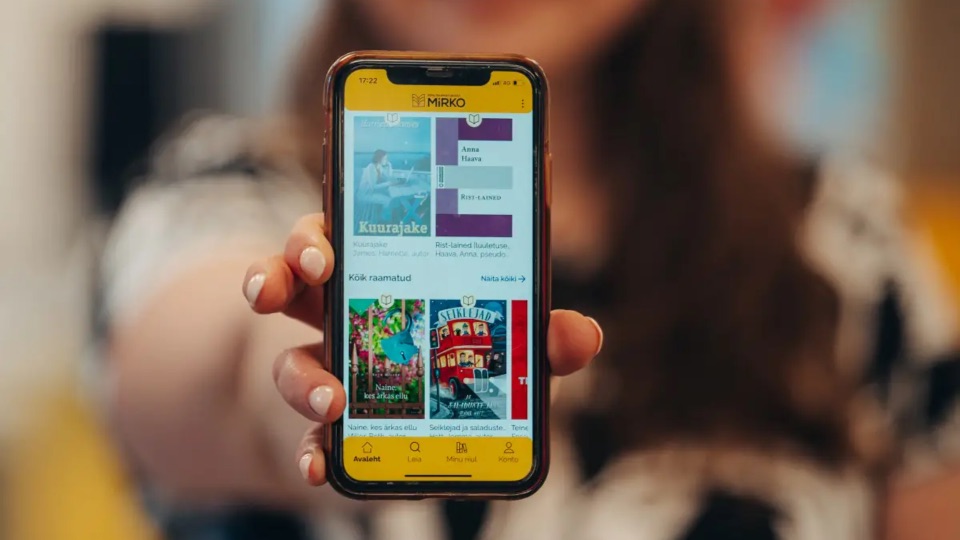
Why MIRKO?
In the recent past, getting your hands on an affordable book was a hassle in Estonia.
Before MIRKO if you wanted to read a paperback, you needed to summon your inner Frodo. Enduring the rocky journey of finding a library and then traversing to that specific library was just a part of the deal. You would then need to go through a bureaucratic mountain of borrowing procedures, and then, just when you thought the peak was near, you’d end up paying for a book. And it wasn’t a bargain.
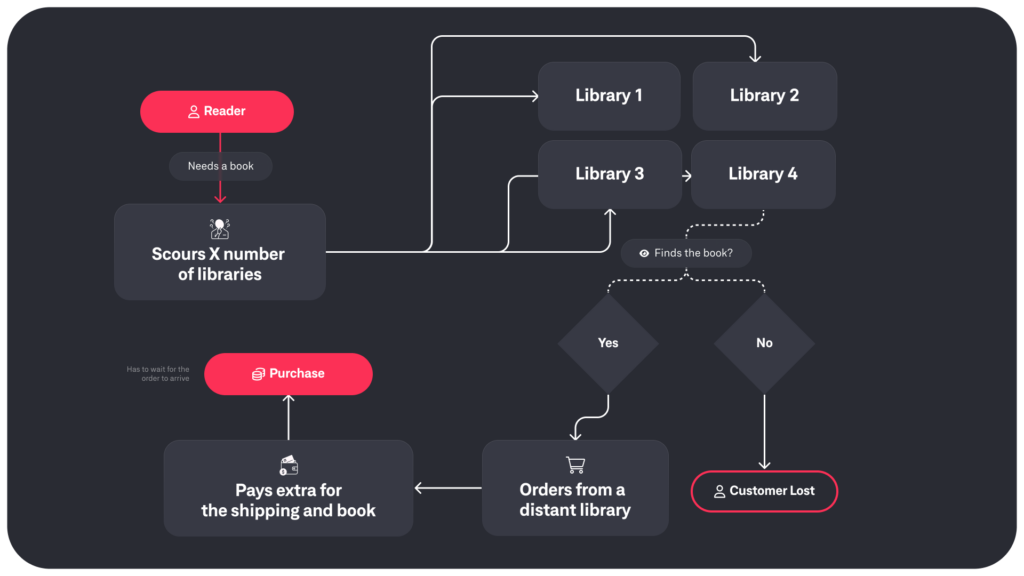
If you’re still wondering why MIRKO… Well, MiRKO is solving a crucial problem for readers. The platform eliminates the hassles and restrictions associated with borrowing or buying books. If readers want to save a penny and borrow, MIRKO allows them to look beyond their friends or a book club. If they’re used to buying, well, they’ll find a platform that joins hundreds of libraries all in one place a convenient mode of getting a book. It’s free; as rich as any modern, commercial book platform; and it’s great both for libraries and readers alike.
The landscape that MIRKO is trying to reshape isn’t just about books. It’s about breaking limits, turning problems into a sequence of few clicks, and making knowledge an accessible cultural commodity. With MIRKO we pictured a Frodo in a cool-headed scenario. A journey that closely resembles this one:
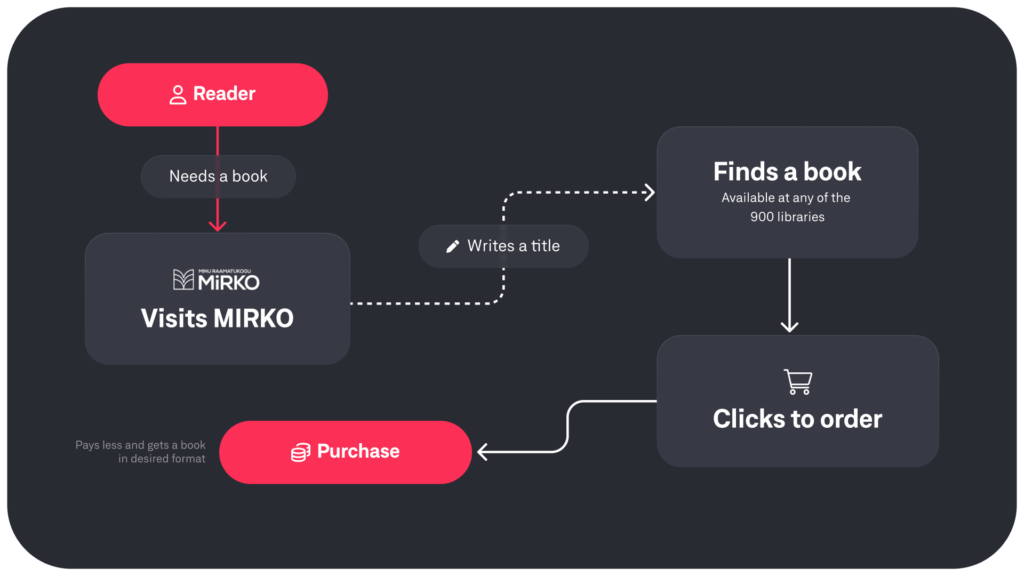
So, what’s MIRKO?
Developed by Net Group for the National Library of Estonia, MIRKO is a reader’s passport to a streamlined process of getting books. Picture Hubert, a reader in Tallinn. With MIRKO’s launch in 2022, his experience of borrowing books took a digital turn.
“Books on the Move” MIRKO’s first released application, is a virtual hub where Hubert can easily access collections from all contributing libraries. Navigating through MIRKO’s app, he uses a search function to bring the much-praised business books available to his fingertips.
Later on down the scope came another app. With “E-publication borrowing”, books, audiobooks, and periodicals become essential offerings of MIRKO. Hubert, alongside other 13,000+ users, could now borrow from a pool of two million physical copies, 3,000 ebooks, and 300 audiobooks. Without any location ties whatsoever, he ends up paying only for a courier service.
Hubert dives into a pool of two million physical copies, 3,000 ebooks, and 300 audiobooks. He can use a search function where he can find books not just by titles, but by the year they’ve been published. In fact, when in need of specific academic literature, he can search publications by their unique publishing codes.
Hubert realizes MIRKO is more than a digital library. It’s a realm where borrowing isn’t a chore; it’s a swift transaction, an ode to Estonia’s embrace of a modern approach to knowledge. Hubert by embraces a borderless library, courtesy of MIRKO’s pragmatic chapters.
The Unseen Weight of Breaking Ground
The term ‘first mover’s advantage’ is commonly used in startup culture. Fancy business books and leadership figures often credit big players’ success to them being forerunners. Still, any company that tried to innovate knows that being first is actually a (dis)advantage. Pioneering requires companies to navigate untested waters. There are inherent costs associated with development, trial and error, and eventually building market awareness.
When the National Library of Estonia (RaRa) commissioned Net Group to come up with a book-borrowing solution, MIRKO’s journey was not without its challenges. In fact, to our knowledge, not a single similar concept existed worldwide. While various elements or features may be available elsewhere individually, there appears to be no existing free-to-use solution that integrates audiobooks, e-books, and paper books from different libraries as far as we know.
Crafting a state-wide platform involved a lot of technical obstacles. From navigating diverse databases to consolidating information seamlessly, MIRKO grappled with the complexity of handling vast amounts of data. In addition, MIRKO needed to accommodate various borrowing conditions set by publishers and come up with descriptions for all publications. A simple ID-scan sign-up and a search button also needed a far more complex underlying work. The introduction of ebooks, brought complexity in terms of configuring publications, handling files, and setting up a diverse array of mobile devices.
After overcoming this set of challenges, project goals determined with RaRa were met in full. Net Group built a simple and user-friendly book-borrowing platform that now boasts impressive metrics and outcomes.
MIRKO By The Numbers
Ultimately, breaking ground with a new solution comes down to a market response. Whether it was received well or bounced back, depends heavily on the initial post-launch period. Here are the numbers that validated the MIRKO venture as a success across-the-board.
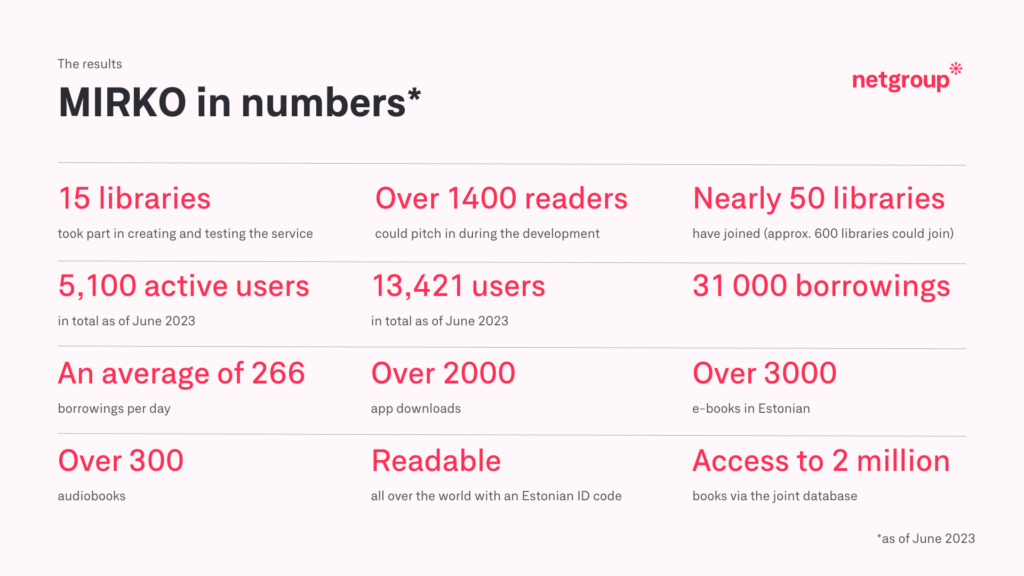
Aside from market reception, the latest enhancements MIRKO was able to serve to it’s userbase include:
- Friend-to-friend borrow. MIRKO users can choose to assign books and periodicals to their friends and family.
- Voiceful Pages. Readers can now enjoy immersive auditory experiences read by artificial voices of “Tõnu” or “Eva.”
- Mobile-friendly. Online site and mobile app for e-publications allow users to read and listen to borrowed and downloaded books.
- Fuzzy search. When recalling a title gets challenging, readers are able to conduct searches for given issues or years with a fuzzy search feature.
Similar insights

Inside Europe’s Cybersecurity Skill Shortage in 2026
17/02/2026
Which Software Development Process Is Best for Your Company?
10/02/2026
How To Know If Your Business Is Ready To Scale Internationally
21/01/2026
8 Hybrid Commerce Mistakes Companies Repeat in 2026
13/01/2026
Smart Workflows: AI Tools and Tips for Busy Leaders
16/12/2025
Supply Chain Attacks: Rethinking Third-Party Trust
10/12/2025
Choosing the Right Tech Stack in Uncertain Times
25/11/2025
How to Pitch and Get Your Ideas Approved at Work
12/11/2025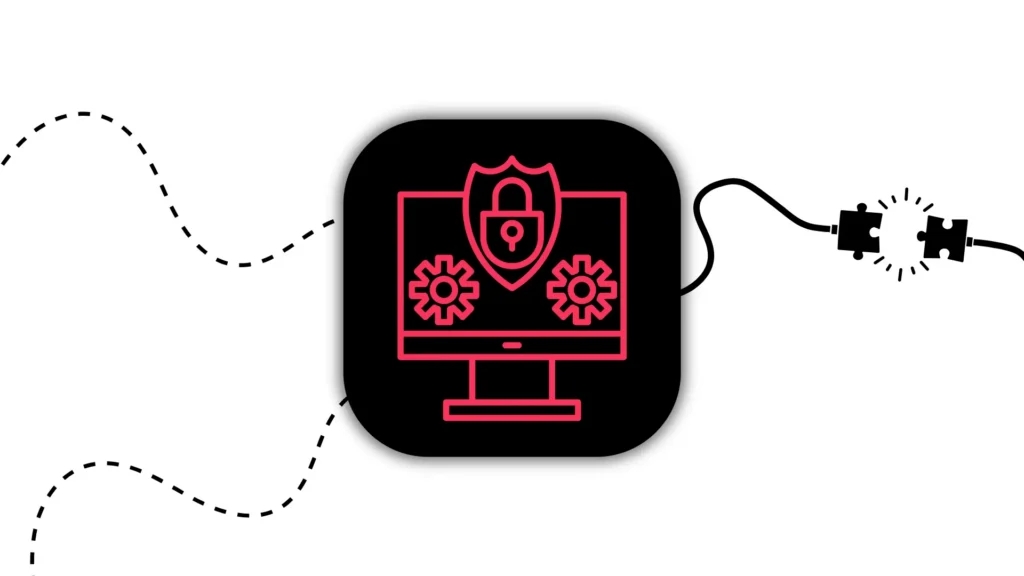
12 AI Cyberattacks That Made CEOs Very Cautious
21/10/2025
Let the success
journey begin
Our goal is to help take your organization to new heights of success through innovative digital solutions. Let us work together to turn your dreams into reality.